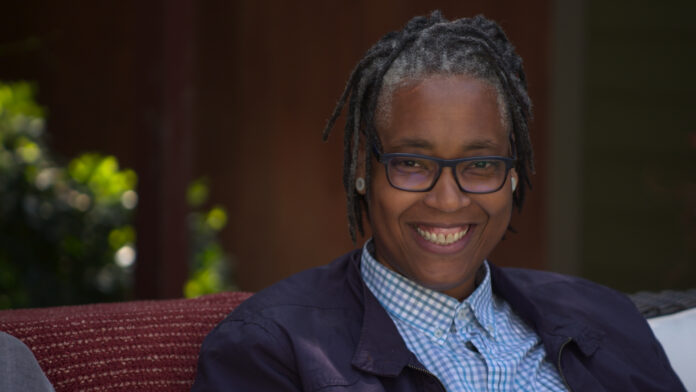The I in LBGTQIA+ are, arguably, the least visible members in the queer community. The illuminating documentary, “Every Body,” opening June 30, advocates for intersex awareness and rights. Director Julie Cohen presents three admirable intersex case studies to show how binaries about gender need to be reconsidered in a world where 1.7% of the population are intersex.
Alicia Roth Weigel was raised in Philadelphia and now lives in Austin. She was born with an XY chromosome and a vagina but also had testes. Sean Saifa Wall was assigned female at birth — after the doctor first marked and scratched out an indeterminate box — but had no uterus. River Gallo, a filmmaker, was born without testicles. All three subjects were told to keep silent about their intersex identity, which created a strong sense of shame.
Moreover, each of these intersex individuals underwent surgeries that were meant to “fix” their gender or genitalia. None of them consented. Their parents were also misled about the need for surgery, which was infuriating. Gallo, in particular, had to have prosthetic testicles inserted as a teen. Weigel recounts using a dilator as a young girl to stretch her vagina and carrying tampons because her friends did, even though she never needed one. Wall also expresses concerns that his mother was practically bullied into having unnecessary medical procedures.
“Every Body” addresses the lack of information and education about the intersex community and how managing genital appearance and gender identity can be harmful. Weigel, Wall, and Gallo all wish they had been consulted and been given the chance to make a decision about the gender they wanted to be. They have become activists hoping to end the practice of genital surgery without consent.
Cohen presents each of these stories in an engaging fashion, especially when she interviews all three subjects together and they share and relate to each other’s experiences. There are also clips of Weigel and Wall speaking out about intersex rights, or Weigel and Gallo demonstrating to stop intersex surgeries, which are empowering. The film shows how laws such as bathroom bills or wanting to change one’s name or gender on a legal document (e.g., a driver’s license) impact the intersex community as well as the trans and non-binary community.
“Every Body” also looks at the critical case of David Reimer, who was born a male in 1965, but after his penis was damaged during circumcision, he was raised — on the recommendation of sexologist John Money — as a female. The case was meant to address the nature/nurture issue in children as Reimer had a twin brother. Of course, Reimer was traumatized by this horrific “gender experiment,” and struggled emotionally as a result. While he married a woman who had three kids — Reimer could not have children — he eventually committed suicide.
The Reimer case is historically important in showing how a doctor’s influence can have a severe, negative impact on gender identity. The agenda against Money and other doctors like him has merit but it should have been a separate film, however related it is to the intersex issues presented in “Every Body.” There is little gained watching Weigel and Wall viewing a segment about the case and expressing horrified reactions. And Cohen spends significant time retelling Reimer’s narrative through “Dateline” interviews and other archival clips that repeat the points that its subjects have already been making about gender identity and surgeries. In contrast, when the film’s subjects talk in real time with the mother of an intersex child, they applaud her efforts to resist surgery and determine the best for her child.
The documentary is best when it focuses on its three subjects. Scenes of Wall attending a gallery in Berlin where he posed nude to create awareness as part of an exhibition on intersex people provides a sense of goodwill about body autonomy that the film promotes. Gallo is seen having a candid discussion with their mother or attending a gala that shows how they have grown and embraced their intersex identity.
There are also a few brief scenes where the subjects talk about dating. Weigel is seen swiping left on a bunch of guys who do not interest her. Wall indicates dating has not been a problem for him, but does admit to having some fraught sexual experiences earlier in his life. Cohen is appropriately not invasive through presenting these subjects.
But there is perhaps too little discussion of the psychological damage, depression and lack of self-worth intersex people — and by extension trans and queer/non-binary people — feel when they are seen as “other.” This is hinted at throughout the film, but it feels underexplored in that the subjects, all of whom have a strong sense of self, do not discuss how they combatted their feelings of alienation and suicidal ideation. They talk about the difficulties of coming out as intersex, but explaining how they navigated the challenges they have faced might have been useful for greater understanding.
“Every Body” is a respectful portrait of a handful of members of the intersex community, but Cohen’s film covers too much ground without much depth.
